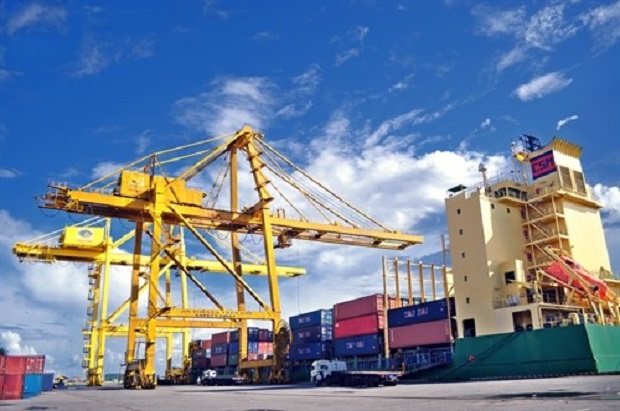Work starts on 2nd phase of Tien Sa Port
The Da Nang Port JSC started the second phase of a project to expand Tien Sa Port on July 31, to make it a modern container port in the central region.
 |
| Goods are being handled at Tien Sa Port in Da Nang (Source: VNA) |
When it is completed at an estimated cost of nearly 1.1 trillion VND (49.3 million USD) by June 2018, Tien Sa Port is expected to be able to handle 70,000 DWT vessels and 10 million tonnes of cargo a year.
The expansion project will cover an area of 60,000sq.m, raising the port’s total area to about 31ha. In addition, two new piers, measuring 310m and 210m in length, will be constructed for docking container ships. It will be equipped with two cranes and synchronous infrastructure to ensure effective use of the port.
The project has drawn the attention of the people after the port’s management board decided not to use Official Development Assistance (ODA) funds for the port, and appealed for public investments..
The smooth and effective operation of the port’s first phase has made its leaders confident of appealing for investment themselves for their upgrade project. On the other hand, the rising value of the Japanese Yen currency has caused difficulties for the payment of the first phase’s loans and their interest rate. In addition, the large scale of the project, with several categories, could prolong its implementation if the port uses the ODA loan. These are the reasons why appealing for public investments can reduce the company's debt payment pressure in the long term.
The company’s General Director Nguyen Huu Sia said the company had raised 36% of its total investment, borrowing 31% and appealing for 33% from shareholders, instead of using the ODA to minimise risks and stay active in its financial plans. In the financial mobilisation process, the DA Nang Port has received commitments and supports from Viet Nam National Shipping Lines (Vinalines), investment funds and big banks for the project’s investment.
Director Sia said with an increasing volume of goods being handled at the port, the payback period was expected to be 10 years, instead of 14-15 years in other similar projects.
He added the upgrade project is extremely vital as the increasing quantity of goods going through the port has reached an overload level.
Statistics from the company showed that in the first half of the year, the port handled 146,000 TEUs (20-foot equivalent unit), posting a 19 percent year-on-year increase. Notably, the volume of containers handled at the port reached record levels. Between May and June, the loading capacity reached the highest level of 29,431 TEUs.
Da Nang People’s Committee Chairman Huynh Duc Tho said the port could handle up to 10 million tonnes of goods a year.
“The second phase of the project will play an important role in the city’s transport development master plan by the year 2020 with orientations towards 2030. It would also be suitable with the marine development strategy of Da Nang, and Viet Nam as a whole,” ChairmanTho said.
The city leader said the project faced some difficulties relating to land procedures and environment impacts in the initial period. However, they have quickly overcome the difficulties with the support of the Transport Ministry, the municipal People’s Committee and local relevant agencies as well as available infrastructure.
The port is designed to handle 14 million tonnes of cargo, including 800,000 TEUs (twenty-foot equivalent unit), by 2025.As scheduled, Tien Sa Port will be built as a ‘valley’ of logistics, warehouse, transport and digital customer clearance services, besides having representative offices of shipping companies and banks.
The port, established in 1976, has operated as a limited company under the ownership of the Viet Nam National Shipping Lines (Vinalines) since 2008 before becoming a joint stock company in the middle of 2014.
According to Viet Nam’s seaport system development plan towards 2020, the Da Nang Port has been confirmed as a major commercial port in the central region, making it one of the key gateways to the East Sea from the sub-Mekong region.
It handles cargo communication and promotes economic development and tourism in the Vietnamese central localities and the Central Highlands, as well as southern Laotian and northeast Thai localities via the East-West Economic Corridor.
Last year, Da Nang’s ports handled a record 6.5 million tonnes of cargo, and hosted nearly 120,000 international cruise ship passengers.
The Da Nang Port JSC also plans to develop Lien Chieu Port to ease congestion at the overloaded existing Tien Sa Port.
(Source: Da Nang Today/VNA)